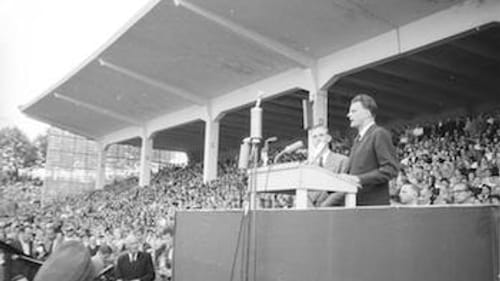Stay in the Loop
BSR publishes on a weekly schedule, with an email newsletter every Wednesday and Thursday morning. There’s no paywall, and subscribing is always free.
Billy Graham meets his maker (at last)
Billy Graham: The final verdict
“Those who reject Christ,” evangelist Billy Graham insisted in 1947, when he was 29, "will be cast into the lake of fire and brimstone to spend eternity." Nearly 60 years later, his lesson had barely budged. "I have one message,” Graham said at his final crusade in June 2005 at Flushing Meadows, New York: “That Jesus Christ came, He died on a cross, He rose again, and He asked us to repent of our sins and receive Him by faith as Lord and Savior, and if we do, we have forgiveness of all of our sins."
Graham, who died this week at age 99, never speculated about the fate of non-Christians. Nor did he address important questions he encountered along the way. Questions like: What makes your religion better than mine? Can I be a good person without believing in your particular god? Why is your god preoccupied with being worshipped? Is it possible you could be wrong?
Pastor to presidents
On balance, Graham probably left the world a better place than he found it. As Bible thumpers go, he wasn't as piously hypocritical as his colleagues Jerry Falwell, Oral Roberts, or convicted felon and rapist Jim Bakker. He spoke up against racism before that was popular. But he was viciously homophobic and confused his audience size, his popularity (he appeared dozens of time on the Gallup Poll’s annual list of the world’s 10 most admired men and women) and his access to political power (he prayed with every U.S. president from Harry S. Truman to Barack Obama) with goodness.
As Christian pastors go, he was no Martin Luther King Jr. (who gave his life for equal rights) or Dietrich Bonhoeffer (executed by the Nazis for his vocal opposition to Hitler’s genocidal persecution of Jews) or József Cardinal Mindszenty (tortured and imprisoned by Hungarian Nazis and Communists alike for his refusal to endorse either creed).
My night with Billy
I attended a Billy Graham Crusade in 1957 as part of a crowd of 20,000 at Madison Square Garden. It was a slick show, to be sure, full of hymns, hosannas, and the sort of audience that I, at age 14, had never encountered before in New York. To my right sat an elderly woman who sang all the hymns at the top of her voice. In front of me sat a young man with sideburns and a leather jacket, reading The Red Badge of Courage; he did not look up from his book once during the service. Nearby sat a woman fast asleep and an old man with long hair and a beard, wearing a burlap bag. Graham indeed proved a dynamic speaker that night, but he was all salt and no food. His main point was that we’re all sinners, and the only way we can purify ourselves is by surrendering to Christ.

When he asked us to come forward and give ourselves to Jesus, more than 500 people responded, many of them teenagers. I was not among them. I heard nothing that night to budge me from the rational basic idea preached by my own rabbi, Mordecai Kaplan, the founder of Judaism's Reconstructionist branch: what matters is not God in Heaven, but human aspirations toward godliness here on Earth.
Baptist minister, Jewish audience
For that matter, I found nothing that night to match a profound religious and intellectual moment I experienced 13 years ago among fewer than 200 congregants at Philadelphia's Society Hill Synagogue. Our rabbi, Avi Winokur, had invited a black Baptist minister from Queen Village to address our congregation. Upon ascending to the pulpit, this pastor exclaimed, “I believe Jesus Christ is my Lord and Savior!” Then he paused, gazed out at his Jewish aiudience, and added: “That may not work for you. But it gets me through the day.”
Here was a truly valuable idea — not only about religion, but about political philosophy as well: It’s not a matter of who’s right or wrong. It’s whatever gets you through the day.
In his autobiography, Graham wrote: “I have often said that the first thing I am going to do when I get to Heaven is ask: ‘Why me, Lord? Why did You choose a farm boy from North Carolina to preach to so many people, to have such a wonderful team of associates, and to have a part in what You were doing in the latter half of the 20th century?’”
So now Billy Graham is up there, jostling for God’s attention with the other 151,600 people who die across the world every day. Assuming God can spare even a few seconds for Billy Graham, his answer might go something like this: “It wasn’t my idea. You were good-looking, articulate, ambitious, and you possessed superb organizational skills geared to the age of jet travel. You did what got you through the day. Next!”
Sign up for our newsletter
All of the week's new articles, all in one place. Sign up for the free weekly BSR newsletters, and don't miss a conversation.

 Dan Rottenberg
Dan Rottenberg